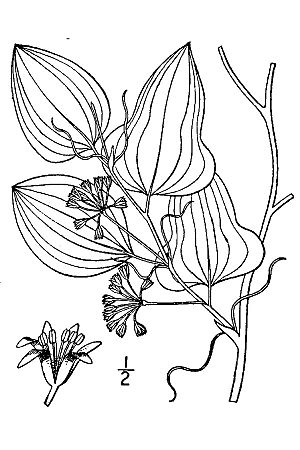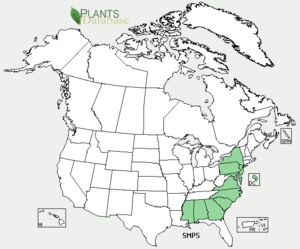Bamboo vine facts for kids
Quick facts for kids Bamboo vine |
|
|---|---|
 |
|
| 1913 illustration | |
| Conservation status | |
| Scientific classification | |
| Genus: |
Smilax
|
| Species: |
pseudochina
|
 |
|
| Range within North America | |
| Synonyms | |
|
Synonymy
Smilax pseudo-china L.
Smilax hederifolia Mill. 1768 not Beyr. ex Kunth 1850 Smilax inermis Walter Smilax tamnifolia Michx. Smilax farinosa Raf. Smilax pandurata Raf. 1840, not Pursh 1813 Coprosmanthus tamnifolius (Michx.) Kunth Nemexia tamnifolia (Michx.) Small Smilax leptanthera Pennell Nemexia leptanthera (Pennell) Small |
|
Smilax pseudochina is a type of plant known as a perennial herb. This means it's a plant that lives for more than two years, and its stems are not woody. It belongs to the greenbriar family. People often call it bamboo vine or false chinaroot. You can find this plant growing along the Atlantic Coast of the United States. Its range stretches from Long Island in New York State all the way south to Georgia.
Contents
What is Bamboo Vine?
Smilax pseudochina is a climbing plant that grows like a vine. It can reach up to 2 meters (about 7 feet) tall. Its stems do not have thorns and they grow back each year.
How Does It Grow?
The stems of the bamboo vine have many thin parts called tendrils. These tendrils twist around other objects, helping the plant climb high. The leaves are smooth and have no hairs. They are shaped like a triangle or an oval. Sometimes, they can look almost like an arrowhead at the bottom.
The leaves are usually 5 to 12 centimeters (2 to 5 inches) long and 2 to 5 centimeters (1 to 2 inches) wide. The edges of the leaves are often straight or slightly curved inward. This special shape helps tell it apart from other Smilax plants, which usually have leaves with outward-curving edges. The main stem might not have branches, or it could have a few.
Flowers and Berries
The flowers of the false chinaroot are greenish and have six petal-like parts called tepals. This plant is dioecious, meaning male and female flowers grow on separate plants. The flowers open in June.
By September, the plant produces round, blue or black berries. These berries have a waxy coating. They grow in clusters called umbels, which look like tiny umbrellas. These clusters hang from the upper leaves and can hold 10 to 35 flowers or fruits.
Where Does It Grow?
False chinaroot can grow in many different places. It likes both dry and moist areas. You can find it in wet places like bogs, marshes, and damp woods. It also grows in drier spots like dry woods and sandy thickets.
Is Bamboo Vine in Danger?
The false chinaroot plant is facing some challenges in different states.
- In Pennsylvania, it is considered extirpated. This means it no longer grows there naturally, even though it once did.
- In New York, it is listed as endangered. This means it is at high risk of disappearing from the state.
- In Maryland, it is listed as threatened. This means it could become endangered in the future if not protected.


